First, the grammar
In old norse, there are two related words, “víking” and “víkingr”. These words are NOUNS. The first is a feminine noun, and refers to the action of the sea-voyage or raid they went on. The second is a masculine noun, and refers to someone who goes on one of these trips. So both nouns are tied to the activity of going on these (presumably nefarious) overseas trips. Not everyone who spoke old norse and lived in Scandinavia in the 9th-11th centuries was a viking; only those connected with those voyages.

There was no verb form in old norse. Yes “víking” refers to the action, but that isn’t the same as saying it is a verb (ie how the word was grammatically used). In part, this mistake might be due to the “-ing” ending, which in English is often associated with verbs. But in any of the possible etymological origins of the words, be it Old Norse, Old English, Old Saxon or Old Frisian, the “-ing” suffix means “someone who belongs to” or “someone who comes from”. The first part might come from any of a number of origins; “vika”,”vík”, “Víkin/Viken”, “víkja”. We just don’t know for certain.
In modern languages such as English, we can often describe our actions in many different, somewhat equivalent ways; like “I swim” (“swim” obviously being the verb here), “I am swimming” (“swimming” being the present participle) and “I have a swim” (“swim” being a noun in this case). But in other languages, such as old norse, this is not the case. With the action “víking”, there is no verb, so you cannot write the equivalent of the first two forms as I did for “swim”. You can only write the equivalent of the last (noun) form: “I go on a raid/víking”; “Ek fer í víkingu.” People seem to think that action=verb, and so assume that the word must be a verb. It doesn’t work like that.
Here are the noun declension tables for both forms:
| masculine | singular | plural | ||
|---|---|---|---|---|
| strong a-stem | indefinite | definite | indefinite | definite |
| nominative | víkingr | víkingrinn | víkingar | víkingarnir |
| accusative | víking | víkinginn | víkinga | víkingana |
| dative | víkingi | víkinginum | víkingum | víkingunum |
| genitive | víkings | víkingsins | víkinga | víkinganna |
| feminine | singular | plural | ||
|---|---|---|---|---|
| strong ō-stem | indefinite | definite | indefinite | definite |
| nominative | víking | víkingin | víkingar | víkingarnar |
| accusative | víkingu | víkinguna | víkingar | víkingarnar |
| dative | víkingu | víkingunni | víkingum | víkingunum |
| genitive | víkingar | víkingarinnar | víkinga | víkinganna |
Note that you will see some historic examples of dative and genitive feminine noun declensions simply written “víking”. The spelling of these forms changed during the course of the norse age – this pattern of having a -u suffix on these declensions is not typical, but is not uncommon for feminine nouns with a -ing ending.
Historic evidence
Some people seem to think that the word “viking” was never used during the “viking age”. But that’s not true. We have physical evidence in the form of runestones that demonstrates how the words were used. Here are a few examples:
Masculine noun víkingr
Sm 10
-u[(k)]i (:) reisti : stein (:) eftir : kunar : sun : kirims × ¶ kuþ healbi sel hans ¶ tyki × ¶ uikikr
[T]óki(?) reisti stein eptir Gunnar, son Gríms. Guð hjalpi sálu hans! Tóki víkingr.
”Tóki(?) raised the stone in memory of Gunnarr, Grímr’s son. May God help his soul! Tóki the viking.”
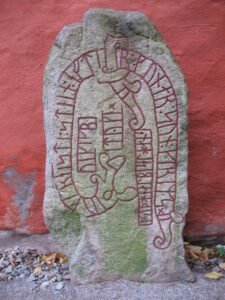
G 370
uatar : auk hilkaiʀ : raistu : stain iftir hailka f-þur : sin : hn : uahʀ -istr : farin miþ uikikum
Hvatarr(?) ok Heilgeirr(?)/Hallgeirr(?) reistu stein eptir Helga, f[ǫ]ður sinn. Hann var [v]estr farinn með víkingum.
”Hvatarr(?) and Heilgeirr(?)/Hallgeirr(?) raised the stone in memory of Helgi, their father. He travelled to the west with the Vikings.”

DR 216
§A osraþr auk hiltu(-)-ʀ ¶ raisþu stain þansi ¶ aft froþa fronti sin ¶ sin ian han uas þo foink ¶ uaiʀa §B ian han uarþ tauþr o suo¶þiauþu auk uas furs ¶ i frikis ioþi þo aliʀ uikikaʀ
§A Ástráðr ok Hildu[ng]r/Hildv[íg]r/Hildu[lf]r reistu stein þenna ept Fraða/Freða, frænda sinn sinn, en hann var þá feikn(?) vera, §B en hann varð dauðr á Svíþjóðu ok var fyrstr(?) í(?) Friggis(?) liði(?) þá allir víkingar.
”§A Ástráðr and Hildungr/Hildvígr/Hildulfr raised this stone in memory of Fraði/Freði, their kinsman. And he was then the terror(?) of men. §B And he died in Sweden and was thereafter the first(?) in(?) Friggir’s(?) retinue(?) and then: all vikings.”
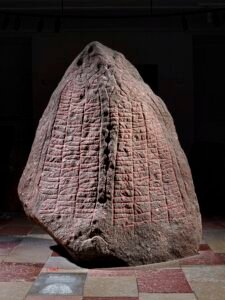
Feminine noun víking
Vg 61
: tula : sati : sten : þ… …[iʀ kʀ : sun] : sin : harþa × kuþon : trok : sa × uarþ : tuþr : o : uastr:uakm : i : uikiku :
Tóla setti stein þ[enna ept]ir Geir, son sinn, harða góðan dreng. Sá varð dauðr á vestrvegum í víkingu.
”Tóla placed this stone in memory of Geirr, her son, a very good valiant man. He died on a viking raid on the western route.”
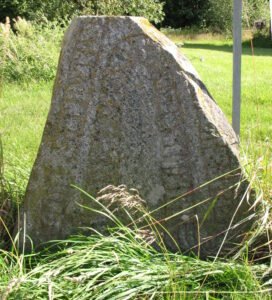
DR 330
§A …usti : auk : kunar : …u : stina : þasi : aiftiʀ : kn… ¶ … …biurn : filaka : si(n)(-) §B : þiʀ : trikaʀ : uaʀu : u–(-) –isiʀ : i · uikiku
§A Tosti(?) ok Gunnarr … steina þessa eptir … [ok] …bjǫrn, félaga sín[a]. §B Þeir drengjar váru v[íða] [ón]eisir í víkingu.
”§A Tosti(?) and Gunnarr … these stones in memory of … [and] …-bjǫrn, their partners. §B These valiant men were widely renowned on viking raids.”
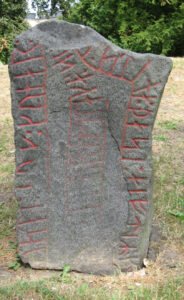
DR 334
aþiʀ : lit : hukua : runaʀ : þisi : uftiʀ : osur : bruþur : sin : is : nur : uarþ : tuþr : i : uikiku :
Faðir lét hǫggva rúnar þessar eptir Ǫzur, bróður sinn, er norðr varð dauðr í víkingu.
”Faðir had these runes cut in memory of Ǫzurr, his brother, who died in the north on a viking raid.”
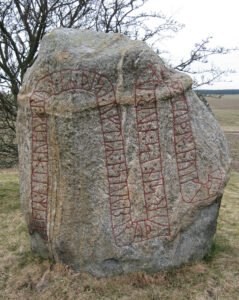
Inscriptions and translations are from the Scandinavian Runic-text Database, Department of Scandinavian Languages, Uppsala University.
Images are used in accordance with the terms of the Creative Commons Attribution-Share Alike 3.0 Unported license from Wikimedia Commons.

Leave a Reply